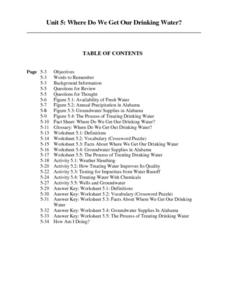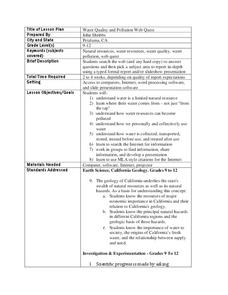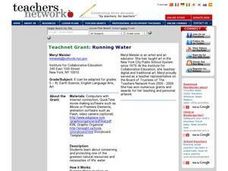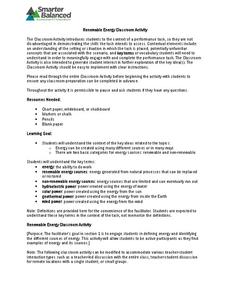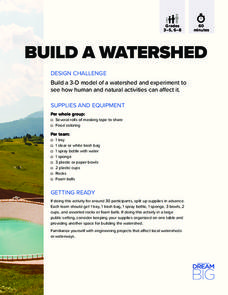Curated OER
Water Resources
Students study water resources that are important to the people of North American and Africa. They use satellite images and data to explore how human actions can degrade, improve, or maintain water resources. They analyze and interpret...
Alabama Wildlife Federation
Wildlife Habitat Checklist
Take a walk on the wild side with a project about animal habitats. After kids observe a chosen animal in its home, they describe the animal's food and water sources, shelter, and how it raises its young. They then write a short fictional...
Stanford University
Hurricane Katrina
The adage says that journalism is the first draft of history. How should people evaluate these sources of information? Taking into account various sources, including those from various perspectives and different creators, learners...
Curated OER
Is That Natural?
Students examine how they use and waste natural resources. They participate in a class discussion about natural resources, in small groups complete a worksheet identifying ways students misuse natural resources, and create an...
Curated OER
Water Cycle Terrariums
Students explore the water cycle. They build a model of the water cycle in the form of a terrarium and explain how it demonstrates the water cycle. In addition, they draw a representation of the water cycle demonstrated in the terrarium.
Curated OER
Geography: Water, Water Everywhere
Learners discuss flooding and its causes. They view a Powerpoint presentation about floods and prevention methods. After creating a model with clay and pans, they investigate river behavior in various terrains with different amounts of...
Curated OER
Do Plants Need Water?
First graders observe the effects of varying amounts of water, sun, and air on lima bean plants. They also predict and describe their outcomes in a written report.
Curated OER
Water Cycle
Ninth graders explore ways water moves through various reservoirs on Earth, examine how human activities change water cycle, investigate substances present in water that indicate human activity, and discuss how understanding water cycle...
Curated OER
Testing Your Water
Students perform several water quality tests on groundwater from their area. They use test strips to determine the pH, hardness, alkalinity, nitrates, iron and chloride levels.
Curated OER
Natural Disasters
Students create an expressive painting documenting their experience of a storm. They create a slide show presentation comparing and contrasting the impact and the response to a natural disaster in the 19th century with the impact...
Curated OER
Water and the Earth
In this water and Earth activity, students read a 2 page article on water and the Earth, name the clouds in 2 pictures and then list 4 sources of water in nature.
Curated OER
Water Magic
Students conduct experiments with ice, water and steam to observe the water cycle. They discuss substances that water accumulates from the Earth as it moves through its cycle.
Curated OER
Harvesting Water from Fog
Students analyze the water issues of Cape Verde in the Peace Corp lesson. In this water resources lesson, students analyze the concept of water being harvested from fog. Students explore the Peace Corps project site by watching Nathan...
Curated OER
Where Do We Get Our Drinking Water?
Students compare land to water ratio on our planet, list sources of drinking water, list steps in cleaning water in treatment plant, describe natural filtering process, and explain danger of not testing drinking water from private wells.
Curated OER
Water Quality and Pollution Web Quest
Learners explore how water is a limited resource, where it comes from, how it can become polluted and how it is used. In this water quality instructional activity students search the web to answer given questions and prepare a report...
Curated OER
Water Resources and the Role of the Independent Sector
Students identify the need to maintain and protect our natural resources. In this natural resource lesson plan, students study pictures of the effects of pollution on animals and water. Students brainstorm a list of ways water is an...
Curated OER
Who Will Care for the Water?
Students discover how humans impact natural resources. In this environmental instructional activity, students identify water resources in the local area and construct a T-chart to compare the positive and negative effects humans have on...
Curated OER
Running Water
Sixth graders create products that feature the importance of water conservation. In this environmental stewardship lesson, 6th graders explore the water cycle and conduct on water usage. Students also research water pollution and...
Smarter Balanced
Renewable Energy
Renewable and non-renewable energy sources are the focus of a series of activities that prepare learners for a performance task assessment on energy. Groups identify the various sources of energy and classify these sources as either...
Texas State Energy Conservation Office
Fueling the Future
Future mechanical engineers and automotive technicians read about various solutions to using gasoline in cars. Included are electric, fuel-cell-powered, and hybrid vehicles.
Centers for Ocean Sciences
Ocean and Great Lakes Literacy: Principle 1
Is your current lesson plan for salt and freshwater literacy leaving you high and dry? If so, dive into part one of a seven-part series that explores the physical features of Earth's salt and freshwater sources. Junior hydrologists...
DiscoverE
Build a Watershed
What's the best way to learn how watersheds work? Build one! Combining engineering, the water cycle, and ecology concerns, the activity is the perfect fit for an interdisciplinary unit. Teams construct a model watershed with simple...
Curated OER
Where Does the Water Go?
Students identify how the geography of the island of Maui influences the sources of water, identify/categorize the users of water on Maui after reading a series of news articles and construct a map of Maui displaying their findings.
Curated OER
Moebius Strips
Learners make Moebius strips and use them to demonstrate the interconnectedness of an environment. They explore the natural cycles (water, oxygen/carbon dioxide, carbon, nitrogen) within the environment. They describe how the cycles are...















